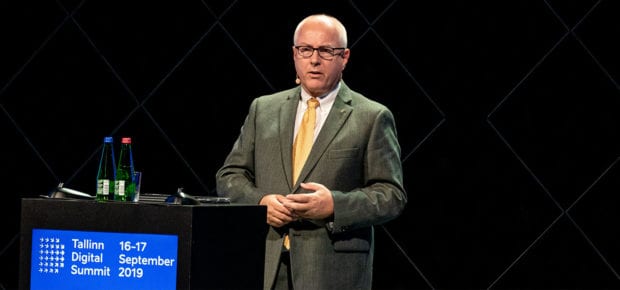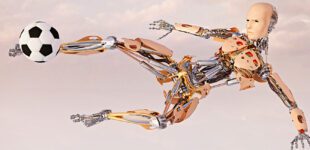September 18, 2019
IEEE Executive Director and Chief Operating Officer Steve Welby spoke to the Tallinn Digital Summit on the importance of collaborative ethical design in today’s most ubiquitous technologies.
Intelligent and autonomous systems are increasingly pervasive in everyday life. With each passing week, we hear more about machine learning, self-driving vehicles and a wide array of self-reliant devices. And in many of these conversations, a core note is the positive impact these systems are having on scientific progress, economic growth and our quality of life.
But these powerful tools can also present social, legal and ethical challenges related to perceptions of systemic risk, data transparency, privacy, ownership, and agency. One of the 17 conclusions from 2018’s Tallinn Digital Summit was that there should be a collective effort to “build trust in artificial intelligence” to help address these concerns.
So how can organizations continue to foster innovation while maintaining public trust? IEEE Executive Director and Chief Operating Officer Steve Welby, who is an IEEE Fellow, explored this issue during a recent address at the 2019 Tallinn Digital Summit, a two-day inter-governmental gathering where political leaders, policy innovators, entrepreneurs, and the tech community focused on the biggest digital transformation questions facing economies, societies, and governments.
In his speech, Welby noted that an interesting paradox has emerged wherein people around the world are increasingly dependent on autonomous technologies, yet are increasingly distrustful of them. “Per the 2019 Edelman Trust in Technology Study, globally 47 percent of people said that technological innovation is happening too quickly and is leading to changes that are not in their best interests,” Welby said.
As an unintended consequence, Welby warned that “these issues can be obstacles to the socially responsible development and use of autonomous and intelligent (AI) systems, and can impact developers, users, and policymakers.” For this reason, it’s important that a foundation of trust be established.
Welby noted that many principles have been created by communities and organizations globally, to provide a framework for building trust. IEEE is doing its part by creating a set of actionable principles on ethically-aligned design, which place AI systems within a human rights framework using broadly-regarded ethical criteria. “For our work, we use the term ‘ethical’ in a rather broad sense to include issues of transparency, accountability, bias reduction, and trustworthiness, that means a system that satisfies such criteria would be ethically more defendable than one that does not,” Welby explained.
This robust international dialogue about the principles surrounding autonomous and intelligent systems that IEEE is helping to drive “should be followed by concrete action to implement viable solutions,” Welby said. IEEE also has a number of standards in development (like project P7000, which aims to support organizations in creating shared value through technology), as well as other trust-building certification programs for organizations and governments.
“Trust is the social glue that enables humankind to progress through interaction with each other and the environment, including our technology,” Welby said, quoting an organizational psychologist. He concluded: “Growing trust in intelligent and autonomous technology is critical to its effective deployment, and ultimately only well-designed autonomous and intelligent systems, in combination with well-qualified data sets, will earn the trust of the public. The need today is for practical tools and mechanisms to demonstrate assurance that autonomous and intelligent systems are well designed and the data sets are of high quality. It is precisely to address this need that IEEE, in partnership with public and private sector partners from all around the world, establishes the consensus-based, globally open standards and certification schemes mentioned above in a transparent and inclusive manner. ”
View Steve Welby’s speech below:
Learn more about IEEE and its approach to ethically-aligned design at Ethics In Action, the IEEE Global Initiative on Ethics of Autonomous and Intelligent Systems.





 Meaningful Momentum or Running in Place?
Meaningful Momentum or Running in Place? AI Through Our Ages
AI Through Our Ages Liquid Infrastructure: Our Planet's Most Precious Resource
Liquid Infrastructure: Our Planet's Most Precious Resource The Impact of Technology in 2025
The Impact of Technology in 2025 Quantum and AI: Safeguards or Threats to Cybersecurity?
Quantum and AI: Safeguards or Threats to Cybersecurity? Why AI Can't Live Without Us
Why AI Can't Live Without Us Bits, Bytes, Buildings and Bridges: Digital-Driven Infrastructure
Bits, Bytes, Buildings and Bridges: Digital-Driven Infrastructure Impact of Technology in 2024
Impact of Technology in 2024 Emerging AI Cybersecurity Challenges and Solutions
Emerging AI Cybersecurity Challenges and Solutions The Skies are Unlimited
The Skies are Unlimited Smart Cities 2030: How Tech is Reshaping Urbanscapes
Smart Cities 2030: How Tech is Reshaping Urbanscapes Impact of Technology 2023
Impact of Technology 2023 Cybersecurity for Life-Changing Innovations
Cybersecurity for Life-Changing Innovations Smarter Wearables Healthier Life
Smarter Wearables Healthier Life Infrastructure In Motion
Infrastructure In Motion The Impact of Tech in 2022 and Beyond
The Impact of Tech in 2022 and Beyond Cybersecurity, Technology and Protecting Our World
Cybersecurity, Technology and Protecting Our World How Technology Helps us Understand Our Health and Wellness
How Technology Helps us Understand Our Health and Wellness The Resilience of Humanity
The Resilience of Humanity Harnessing and Sustaining our Natural Resources
Harnessing and Sustaining our Natural Resources Creating Healthy Spaces Through Technology
Creating Healthy Spaces Through Technology Exceptional Infrastructure Challenges, Technology and Humanity
Exceptional Infrastructure Challenges, Technology and Humanity The Global Impact of IEEE's 802 Standards
The Global Impact of IEEE's 802 Standards Scenes of our Cyber Lives: The Security Threats and Technology Solutions Protecting Us
Scenes of our Cyber Lives: The Security Threats and Technology Solutions Protecting Us How Millennial Parents are Embracing Health and Wellness Technologies for Their Generation Alpha Kids
How Millennial Parents are Embracing Health and Wellness Technologies for Their Generation Alpha Kids Space Exploration, Technology and Our Lives
Space Exploration, Technology and Our Lives Global Innovation and the Environment
Global Innovation and the Environment How Technology, Privacy and Security are Changing Each Other (And Us)
How Technology, Privacy and Security are Changing Each Other (And Us) Find us in booth 31506, LVCC South Hall 3 and experience the Technology Moon Walk
Find us in booth 31506, LVCC South Hall 3 and experience the Technology Moon Walk Virtual and Mixed Reality
Virtual and Mixed Reality How Robots are Improving our Health
How Robots are Improving our Health IEEE Experts and the Robots They are Teaching
IEEE Experts and the Robots They are Teaching See how millennial parents around the world see AI impacting the lives of their tech-infused offspring
See how millennial parents around the world see AI impacting the lives of their tech-infused offspring Take the journey from farm to table and learn how IoT will help us reach the rising demand for food production
Take the journey from farm to table and learn how IoT will help us reach the rising demand for food production Watch technical experts discuss the latest cyber threats
Watch technical experts discuss the latest cyber threats Explore how researchers, teachers, explorers, healthcare and medical professionals use immersive technologies
Explore how researchers, teachers, explorers, healthcare and medical professionals use immersive technologies Follow the timeline to see how Generation AI will be impacted by technology
Follow the timeline to see how Generation AI will be impacted by technology Learn how your IoT data can be used by experiencing a day in a connected life
Learn how your IoT data can be used by experiencing a day in a connected life Listen to technical experts discuss the biggest security threats today
Listen to technical experts discuss the biggest security threats today See how tech has influenced and evolved with the Games
See how tech has influenced and evolved with the Games Enter our virtual home to explore the IoT (Internet of Things) technologies
Enter our virtual home to explore the IoT (Internet of Things) technologies Explore an interactive map showcasing exciting innovations in robotics
Explore an interactive map showcasing exciting innovations in robotics Interactively explore A.I. in recent Hollywood movies
Interactively explore A.I. in recent Hollywood movies Get immersed in technologies that will improve patients' lives
Get immersed in technologies that will improve patients' lives